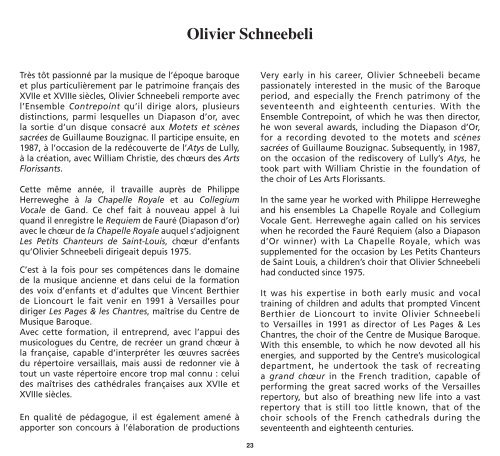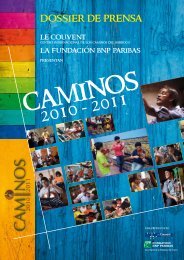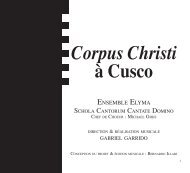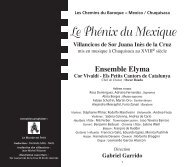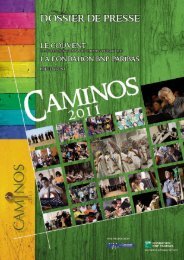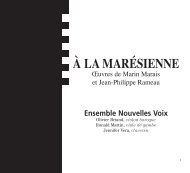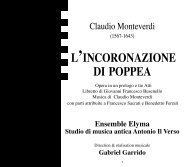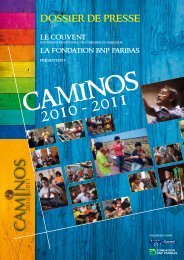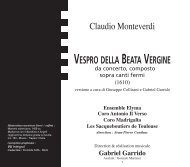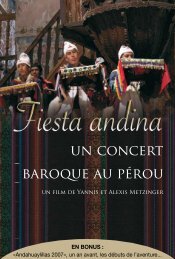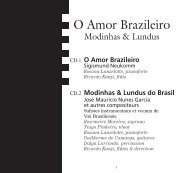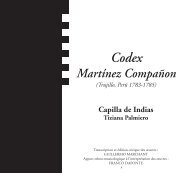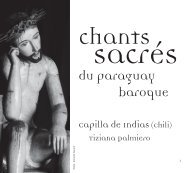Un voyage au cÅur des opéras de Jean-Baptiste Lully
Un voyage au cÅur des opéras de Jean-Baptiste Lully
Un voyage au cÅur des opéras de Jean-Baptiste Lully
You also want an ePaper? Increase the reach of your titles
YUMPU automatically turns print PDFs into web optimized ePapers that Google loves.
Olivier SchneebeliTrès tôt passionné par la musique <strong>de</strong> l’époque baroqueet plus particulièrement par le patrimoine français <strong><strong>de</strong>s</strong>XVIIe et XVIIIe siècles, Olivier Schneebeli remporte avecl’Ensemble Contrepoint qu’il dirige alors, plusieursdistinctions, parmi lesquelles un Diapason d’or, avecla sortie d’un disque consacré <strong>au</strong>x Motets et scènessacrées <strong>de</strong> Guill<strong>au</strong>me Bouzignac. Il participe ensuite, en1987, à l’occasion <strong>de</strong> la redécouverte <strong>de</strong> l’Atys <strong>de</strong> <strong>Lully</strong>,à la création, avec William Christie, <strong><strong>de</strong>s</strong> chœurs <strong><strong>de</strong>s</strong> ArtsFlorissants.Cette même année, il travaille <strong>au</strong>près <strong>de</strong> PhilippeHerreweghe à la Chapelle Royale et <strong>au</strong> CollegiumVocale <strong>de</strong> Gand. Ce chef fait à nouve<strong>au</strong> appel à luiquand il enregistre le Requiem <strong>de</strong> F<strong>au</strong>ré (Diapason d’or)avec le chœur <strong>de</strong> la Chapelle Royale <strong>au</strong>quel s’adjoignentLes Petits Chanteurs <strong>de</strong> Saint-Louis, chœur d’enfantsqu’Olivier Schneebeli dirigeait <strong>de</strong>puis 1975.C’est à la fois pour ses compétences dans le domaine<strong>de</strong> la musique ancienne et dans celui <strong>de</strong> la formation<strong><strong>de</strong>s</strong> voix d’enfants et d’adultes que Vincent Berthier<strong>de</strong> Lioncourt le fait venir en 1991 à Versailles pourdiriger Les Pages & les Chantres, maîtrise du Centre <strong>de</strong>Musique Baroque.Avec cette formation, il entreprend, avec l’appui <strong><strong>de</strong>s</strong>musicologues du Centre, <strong>de</strong> recréer un grand chœur àla française, capable d’interpréter les œuvres sacréesdu répertoire versaillais, mais <strong>au</strong>ssi <strong>de</strong> redonner vie àtout un vaste répertoire encore trop mal connu : celui<strong><strong>de</strong>s</strong> maîtrises <strong><strong>de</strong>s</strong> cathédrales françaises <strong>au</strong>x XVIIe etXVIIIe siècles.En qualité <strong>de</strong> pédagogue, il est également amené àapporter son concours à l’élaboration <strong>de</strong> productionsVery early in his career, Olivier Schneebeli becamepassionately interested in the music of the Baroqueperiod, and especially the French patrimony of theseventeenth and eighteenth centuries. With theEnsemble Contrepoint, of which he was then director,he won several awards, including the Diapason d’Or,for a recording <strong>de</strong>voted to the motets and scènessacrées of Guill<strong>au</strong>me Bouzignac. Subsequently, in 1987,on the occasion of the rediscovery of <strong>Lully</strong>’s Atys, hetook part with William Christie in the foundation ofthe choir of Les Arts Florissants.In the same year he worked with Philippe Herrewegheand his ensembles La Chapelle Royale and CollegiumVocale Gent. Herreweghe again called on his serviceswhen he recor<strong>de</strong>d the F<strong>au</strong>ré Requiem (also a Diapasond’Or winner) with La Chapelle Royale, which wassupplemented for the occasion by Les Petits Chanteurs<strong>de</strong> Saint Louis, a children’s choir that Olivier Schneebelihad conducted since 1975.It was his expertise in both early music and vocaltraining of children and adults that prompted VincentBerthier <strong>de</strong> Lioncourt to invite Olivier Schneebelito Versailles in 1991 as director of Les Pages & LesChantres, the choir of the Centre <strong>de</strong> Musique Baroque.With this ensemble, to which he now <strong>de</strong>voted all hisenergies, and supported by the Centre’s musicological<strong>de</strong>partment, he un<strong>de</strong>rtook the task of recreatinga grand chœur in the French tradition, capable ofperforming the great sacred works of the Versaillesrepertory, but also of breathing new life into a vastrepertory that is still too little known, that of thechoir schools of the French cathedrals during theseventeenth and eighteenth centuries.23


